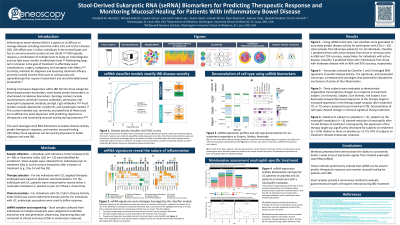Sunday Poster Session
Category: IBD
P0749 - Stool-derived Eukaryotic RNA Biomarkers for Predicting Therapeutic Response and Monitoring Mucosal Healing for Patients with Inflammatory Bowel Disease
Sunday, October 22, 2023
3:30 PM - 7:00 PM PT
Location: Exhibit Hall

Has Audio

Erica K. Barnell, MD, PhD
Washington University School of Medicine
St. Louis, MO
Presenting Author(s)
Elizabeth Wurtzler, PhD1, Clayton Grass, BS1, Jack Land, BS1, Marco Siu, BS1, Austin Isaak, BS2, Hannah Ohms, BS3, Ryan Ghannam, PhD1, Spencer King, MS1, Erica Barnell, MD, PhD4
1Geneoscopy, St. Louis, MO; 2Alabama University, St. Louis, MO; 3Baylor University, St. Louis, MO; 4Washington University School of Medicine, St. Louis, MO
Introduction: Inflammatory bowel disease (IBD) is a spectrum of difficult to manage diseases including ulcerative colitis (UC) and Crohn’s disease (CD). IBD can take months to make an initial diagnosis and effectively treat. Methods for diagnosis and treatment primarily include invasive tests such as colonoscopy and sigmoidoscopy. Current noninvasive options (e.g., fecal calprotectin and C-reactive protein) lack sufficient specificity and are not reliable for predicting therapeutic response or monitoring disease status during treatment.
Methods: Individuals with refractory Crohn’s Disease were identified for enrollment onto the clinical trial. Stool samples were collected at baseline (T0), 6-14 weeks post treatment (T1), and 52 weeks post treatment (T2). Targeted therapies employed were based on physician recommendations. Survey data, measured using the Crohn's Disease Activity Index (CDAI), were collected at all study time points. Fecal calprotectin, C-reactive protein (CRP), endoscopy, and magnetic resonance imaging (MRI) were obtained when possible. Stool samples were subjected to total RNA extraction and next-generation sequencing. Sequencing data was compared to clinical correlates.
Results: In total, 102 stool samples were derived from 68 unique individuals across various time points. Unsupervised hierarchical clustering of seRNA sequencing data identified multiple different transcripts that could be used to segregate individuals based on disease status. These transcripts were employed in a machine learning model to classify disease status based on survey data and biopsy results. The model leveraged 5-fold internal cross validation to determine classifier accuracy across all 102 samples. This model successfully classified individuals as those in remission versus having mild, or moderate/severe disease. Overall model accuracy was 87%. The model showed high classification success (94% accuracy) for moderate/severe disease relative to classification of mild disease (80% accuracy). Receiver operator characteristic (ROC) area under the curve (AUC) for the classifier was 0.86.
Discussion: We demonstrate that stool-derived RNA biomarkers can be used to noninvasively identify disease status for patients with CD. This noninvasive approach could also be applied to other IBD applications, including predicting therapeutic responses and verifying the efficacy of treatment responses.

Disclosures:
Elizabeth Wurtzler, PhD1, Clayton Grass, BS1, Jack Land, BS1, Marco Siu, BS1, Austin Isaak, BS2, Hannah Ohms, BS3, Ryan Ghannam, PhD1, Spencer King, MS1, Erica Barnell, MD, PhD4. P0749 - Stool-derived Eukaryotic RNA Biomarkers for Predicting Therapeutic Response and Monitoring Mucosal Healing for Patients with Inflammatory Bowel Disease, ACG 2023 Annual Scientific Meeting Abstracts. Vancouver, BC, Canada: American College of Gastroenterology.
1Geneoscopy, St. Louis, MO; 2Alabama University, St. Louis, MO; 3Baylor University, St. Louis, MO; 4Washington University School of Medicine, St. Louis, MO
Introduction: Inflammatory bowel disease (IBD) is a spectrum of difficult to manage diseases including ulcerative colitis (UC) and Crohn’s disease (CD). IBD can take months to make an initial diagnosis and effectively treat. Methods for diagnosis and treatment primarily include invasive tests such as colonoscopy and sigmoidoscopy. Current noninvasive options (e.g., fecal calprotectin and C-reactive protein) lack sufficient specificity and are not reliable for predicting therapeutic response or monitoring disease status during treatment.
Methods: Individuals with refractory Crohn’s Disease were identified for enrollment onto the clinical trial. Stool samples were collected at baseline (T0), 6-14 weeks post treatment (T1), and 52 weeks post treatment (T2). Targeted therapies employed were based on physician recommendations. Survey data, measured using the Crohn's Disease Activity Index (CDAI), were collected at all study time points. Fecal calprotectin, C-reactive protein (CRP), endoscopy, and magnetic resonance imaging (MRI) were obtained when possible. Stool samples were subjected to total RNA extraction and next-generation sequencing. Sequencing data was compared to clinical correlates.
Results: In total, 102 stool samples were derived from 68 unique individuals across various time points. Unsupervised hierarchical clustering of seRNA sequencing data identified multiple different transcripts that could be used to segregate individuals based on disease status. These transcripts were employed in a machine learning model to classify disease status based on survey data and biopsy results. The model leveraged 5-fold internal cross validation to determine classifier accuracy across all 102 samples. This model successfully classified individuals as those in remission versus having mild, or moderate/severe disease. Overall model accuracy was 87%. The model showed high classification success (94% accuracy) for moderate/severe disease relative to classification of mild disease (80% accuracy). Receiver operator characteristic (ROC) area under the curve (AUC) for the classifier was 0.86.
Discussion: We demonstrate that stool-derived RNA biomarkers can be used to noninvasively identify disease status for patients with CD. This noninvasive approach could also be applied to other IBD applications, including predicting therapeutic responses and verifying the efficacy of treatment responses.

Figure: A) Unsupervised hierarchical clustering for all patients (n = 102) shows transcripts that were differentially expressed between patients in remission versus patients with active disease. B) Five-fold internal cross validation of a machine learning model was built to stratify patients based on disease status. The model successfully classified patients in remission with 82% accuracy (n = 50) and successfully classified patients with active disease with 90% accuracy (n = 52).
Disclosures:
Elizabeth Wurtzler: Geneoscopy – Employee, Stock Options, Stock-privately held company.
Clayton Grass: Geneoscopy – Employee.
Jack Land: Geneoscopy – Employee.
Marco Siu: Geneoscopy – Employee.
Austin Isaak indicated no relevant financial relationships.
Hannah Ohms indicated no relevant financial relationships.
Ryan Ghannam: Geneoscopy – Employee.
Spencer King: Geneoscopy – Employee.
Erica Barnell: Geneoscopy – Employee, Stock Options, Stock-privately held company.
Elizabeth Wurtzler, PhD1, Clayton Grass, BS1, Jack Land, BS1, Marco Siu, BS1, Austin Isaak, BS2, Hannah Ohms, BS3, Ryan Ghannam, PhD1, Spencer King, MS1, Erica Barnell, MD, PhD4. P0749 - Stool-derived Eukaryotic RNA Biomarkers for Predicting Therapeutic Response and Monitoring Mucosal Healing for Patients with Inflammatory Bowel Disease, ACG 2023 Annual Scientific Meeting Abstracts. Vancouver, BC, Canada: American College of Gastroenterology.

